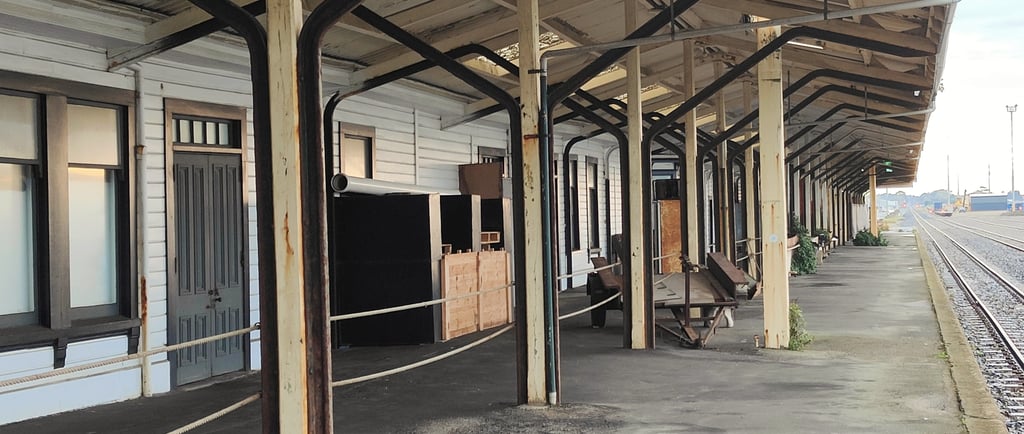Can these reforms bring back passenger rail?
The Inquiry into Passenger Rail long-awaited recommendations, released on 4 July 2023, ask for many reforms. But not enough.
REFORMREGIONAL RAIL
Suraya Sidhu Singh
7/15/20234 min read


The Inquiry into Passenger Rail long-awaited recommendations, released on 4 July 2023, ask for many reforms. But not enough.
After decades of pleading with successive governments to please not smash up our critical national rail infrastructure, last year’s Inquiry into Inter-Regional Passenger Rail came as a surprise to many rail advocates. But with the impacts of climate change now widely felt and rising costs of living, not a moment too soon.
The Inquiry sought to understand if claims of sensible reasons for New Zealand’s lack of passenger rail stack up, and if not, how do we go from today’s shrivelled rail travel options to reviving these once-popular routes?
All change, please
Those who tuned in to the select committee heard a startling array of experts, from economists to engineers to public health specialists (and of course, the armchair type,) illuminate inter-regional rail travel’s benefits – from reduced transport emissions to reduced road accidents to greater mobility for disabled people.
A huge 97 percent of the 1,752 submissions backed expanding affordable, inter-regional passenger rail. It’s rare to see such strong public support for anything.
Inter-regional public transport authority to be established
The report recommends establishing a body responsible for system leadership around all inter-regional public transport, including rail, ferries and coaches. It would identify inter-regional public transport gaps, and work with regional councils and presumably the private sector to fill these.
They’ve certainly identified an obvious problem. Compared with state highways – a co-ordinated network by one central government organisation – inter-regional public transport is piecemeal with no national coordination. It’s even exempt from regional councils’ public transport planning responsibilities, but some still operate it because they think it important.
Strangely, the report doesn’t name KiwiRail among those who will need to work with this body. Hopefully that’s an oversight.
Funding system review
The government is also advised to reconsider funding arrangements for inter-regional passenger rail to better reflect the benefits of these services. The prospect of change here is encouraging.
Funding is another area where State Highways are the Ugly Sisters and rail, Cinderella. State Highways are 100 percent centrally funded while inter-regional public transport must be 50 percent regionally funded. This is a problem because regional councils have very low revenue-raising abilities.
Multiple regional councils would also have to agree any proposed service was a priority and there’s no way to make sure councils contribute fairly, leading to eye-roll results like Auckland Transport contributing no funding to the Auckland to Hamilton train, Te Huia.
Scoping new inter-regional passenger rail services
The report asks the government to scope new Auckland–Wellington, Auckland–Tauranga and Napier–Wellington passenger rail routes. It also suggests looking at extending the Capital Connection train (Wellington–Palmerston North) to Feilding as intact infrastructure would make that straightforward. They say further routes should be scoped, including the South Island, to identify best-value options.
Some submitters pointed to a strong case for sleeper trains, particularly Auckland to Wellington, as overnight journeys in a comfy bed make long travel times less important. Proponents say sleepers must be carefully designed around customer experience – something we’ve failed at in the past.
KiwiRail survives another apocalypse
The report notes many submitters, including the infrastructure commission, Te Waihanga, pointed to conflicts in KiwiRail’s structure harming rail. It says, “KiwiRail’s commercial mandate means investment decisions are often made based on the economic viability of services, rather than… wider societal costs and benefits… even if a rail service would be worthwhile from a public-value perspective, investment is still unlikely.”
Recent Kaitaki Ferry and track evaluation bungles support this.
Submitters were also concerned that KiwiRail controls rail infrastructure while also running freight and passenger services on it. KiwiRail must in theory allow other operators access, but it’s hard to say if their access conditions are fair when any new operator would reduce their profit.
Meanwhile, everywhere in the world, freight is more profitable than passenger rail, meaning one enterprise running both is heavily incentivised to make passenger play second-fiddle.
Despite having heard of avoidable problems created by KiwiRail’s structure, the committee didn’t recommend change. This is part of a pattern where somehow every well-reasoned criticism of KiwiRail runs off them like water off a duck’s back.
Passenger rail a deflating political football
At the recent Future is Rail conference in Wellington, an overarching theme was the struggle caused by passenger rail being a political football in New Zealand. Given it delivers provable economic, social and environmental benefits, it should tick boxes for all major parties. But both National and ACT included statements disagreeing with the report's recommendations.
At the recent Future is Rail conference in Wellington, National infrastructure spokesperson Chris Bishop said the case for inter-regional passenger rail doesn’t stack up economically. Yet, rail developments funded in recent years have demonstrated strong positive returns on investment, like the lower North Island hybrid trains. The same can’t be said for some motorways green-lit under National.
It’s telling that the message from these parties isn’t that we should only fund infrastructure that returns best on investment, but rather, declaring passenger rail doesn’t stack up, despite what business cases find. Rail proponents cross the political spectrum, so National and ACT would benefit from revisiting their stances by actually looking at the benefit-cost ratios.
It’s hard to say whether the Inquiry into Passenger Rail’s proposals will bring more transport choice for New Zealanders. Nationwide inter-regional public transport co-ordination and a review of its funding are long overdue, but a huge opportunity was missed in failing to see that KiwiRail’s structure absolutely must be changed if we’re to bring back affordable, long-distance passenger rail.
